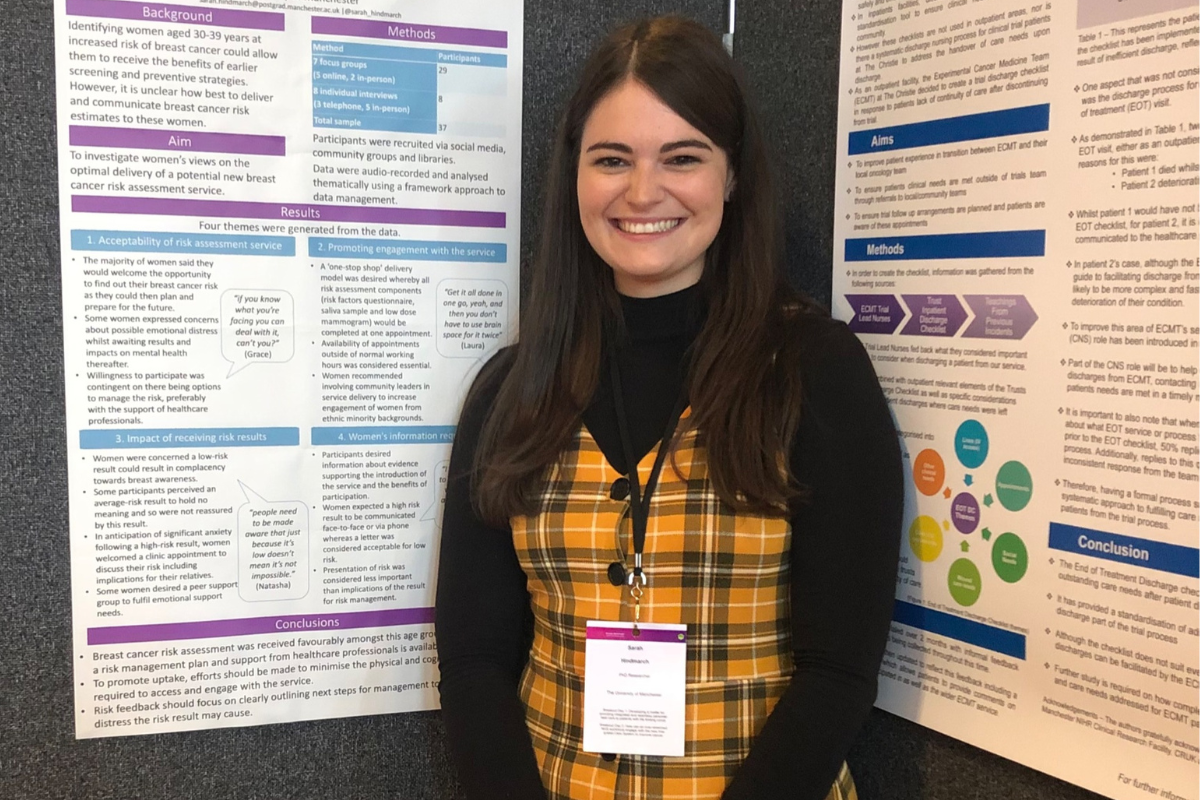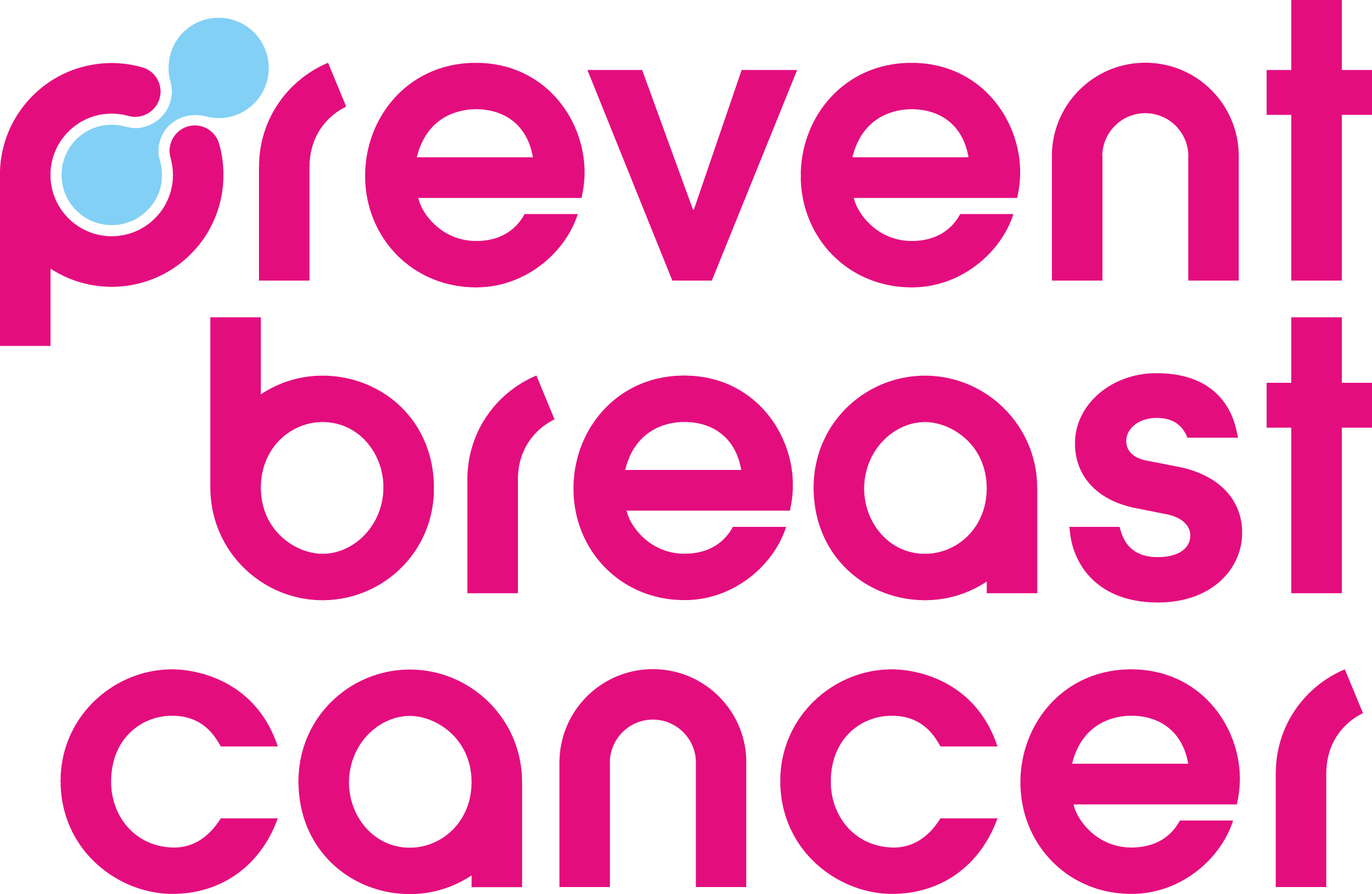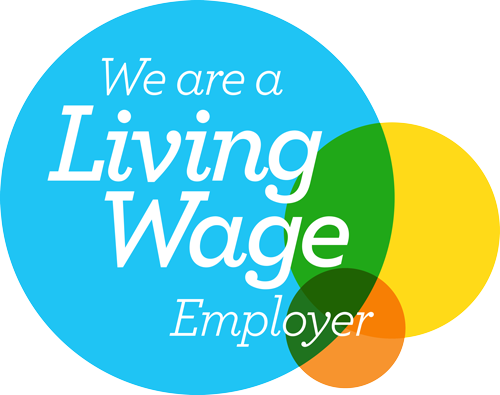Prevent Breast Cancer funds high quality research into both the prediction and prevention of breast cancer, and we work closely with world renown experts in the field. Since our inception, we’ve in fact funded over £4.9 million towards our goal of preventing breast cancer for future generations.
As a charity, we champion all research into breast cancer prevention and appreciate keeping up to date with all the hard work being carried out by the brilliant experts in the scientific community.
One such person is Sarah Hindmarch. Sarah is a PhD researcher based in Manchester, whose current project looks at whether it is a good idea to offer women aged 30-39 years the opportunity to find out their risk of developing breast cancer in the future.
We were delighted to learn all about her research, having funded a previous study looking at breast cancer risk ourselves. Prevent Breast Cancer’s pioneering Predicting the Risk of Cancer at Screening (PROCAS) research study was launched in 2009 and was the UK’s largest ever recruiting breast cancer research study. PROCAS enabled thousands of women to take control of their health by calculating their breast cancer risk at the time of their first mammogram.
Read on to find out more about Sarah’s research and ultimately the impact it will have on the development of more accurate risk prediction models for young women.Could you tell us about your job role, and why you chose to work in this area?
I’m a PhD researcher based in the Manchester Centre for Health Psychology at the University of Manchester. For the past four years, I have immersed myself in the world of breast cancer risk prediction in the hope my research will contribute to the earlier detection of breast cancer in young women and a lower number of women developing and dying from breast cancer. Before starting my PhD, I worked at The Christie in a research team focused on improving patient experience. Here I witnessed first-hand the devastation cancer causes for patients, and their family and friends. But I also saw hope for the future – how tirelessly everyone was working together towards the same goal, that of a cancer free future. This experience inspired me to pursue cancer prevention and early detection research.
What research project/s are you currently working on?
My PhD research aims to understand whether it is a good idea to offer women aged 30-39 years the opportunity to find out their risk of developing breast cancer in the future. Breast cancer risk is best calculated with a combination of three measures: (1) a self-reported questionnaire of known breast cancer risk factors, (2) DNA (genetic material) from a spit sample, and (3) a low dose mammogram (breast x-ray) to look at breast density (the amount of non-fatty tissue compared to fatty tissue in the breast). I have explored women’s views on, and requirements for, breast cancer risk assessment to inform the design and delivery of a risk assessment strategy that is currently being offered to women in Greater Manchester as part of the Breast CANcer Risk Assessment in Younger Women (BCAN-RAY) study. The BCAN-RAY study is funded by the Cancer Research UK Alliance for Cancer Early Detection (ACED) and The Christie Charity.
As part of the BCAN-RAY study, women will be asked to complete three questionnaires and their responses will be analysed to identify the potential benefits and harms of participating in breast cancer risk assessment. Some women who take part in the BCAN-RAY study will also be interviewed about their experience of the risk assessment process to inform whether any changes in materials, delivery/access or provision of information and support are needed.
What impact do you see this project/s making for the future of breast cancer research?
This project will contribute to the development of more accurate risk prediction models for young women. It will also inform refinements to the offer of breast cancer risk assessment to enhance engagement and uptake in future. It is envisaged that this project would initiate a larger study across participating International Alliance for Cancer Early Detections (ACED) centres in the UK and US with the goal of improving cancer early detection in young women. Ultimately, the introduction of population level breast cancer risk assessment has the potential to reduce breast cancer related death in young women aged 30 to 39 years, a population who often have young families and have the most life years to lose from a breast cancer diagnosis.
How will this study support the prevention of breast cancer?
Women identified as being at increased risk of developing breast cancer would be eligible to start breast screening earlier than the general population. They would also have access to preventive strategies such as lifestyle interventions and risk-reducing medication such as Tamoxifen. Increasing access to and uptake of screening and preventive strategies amongst younger women will likely lead to improvements in survival and result in fewer breast cancers.
What is your opinion on the future of the NHS Screening Programme?
The NHS Screening Programme currently adopts a ‘one size fits all’ approach as all women aged 50-70 years are invited every three years for a mammogram. In the future, it is likely that the NHS screening programme will move away from a ‘one size fits all’ approach. Instead, women will be invited to take part in a breast cancer risk assessment and the results of this will inform the screening offered to women. For example, a woman identified as being at high risk would be invited to screening more often. In comparison, a woman identified as being at low risk would be offered the choice to be screened less often. This is known as risk-stratified screening. Adopting a risk-stratified approach has the potential to increase benefits and reduce harms of screening such as overdiagnosis (diagnosis of breast cancers that would never have gone on to cause any harm) and false positives (an abnormality is detected when a person doesn’t have cancer which can lead to unnecessary worry and further tests). We are eagerly awaiting the results of large international trials on whether risk-stratified screening is just as good, if not better, than routine screening so watch this space!
How will your study support the adaption of risk prediction models?
Risk prediction models are currently limited in their ability to predict breast cancer risk in women less than 40 years old. The BCAN-RAY study will assess the contribution of breast density to breast cancer risk in young women. Breast density will then be integrated into risk prediction models, increasing the accuracy of breast cancer risk prediction for women aged 30-39 years.
What would you say to someone interested in pursuing a similar career to you?
Remember: research is a marathon, not a sprint. It can be easy to get bogged down in the detail of day-to-day research and lose sight of the big picture, contributing to feelings of demotivation. When I notice these feelings, I find it useful to remind myself of the small wins and progress I have made so far. Also, start building your network from day one by attending seminars, journal clubs and getting involved in opportunities relevant to your research interests. Never underestimate the power of surrounding yourself with people who lift you up, both at home and at work – be sure to reach out to them in difficult times.
Have you been involved in any challenges / events / campaigns / fundraisers for Prevent Breast Cancer?
No but never say never. I’m still getting over taking part in the Great Manchester Run 10k in 2017 where I was part of a team of 70 members of The Christie staff to celebrate the 70th anniversary of the NHS (25-degree heat is not my friend when running…).
What does a breast cancer free future mean to you?
It means preventing anyone from experiencing the devastating impact of receiving a breast cancer diagnosis and undergoing treatment with the potential to cause long-term impacts on both psychological and physical health.
Thank you to Sarah for taking the time to discuss her fascinating research with us.
Read more about Sarah’s study in detail – ‘Optimising the delivery of breast cancer risk assessment for women aged 30-39 years: A qualitative study of women’s views’.
Find out more about Prevent Breast Cancer’s research.
About Prevent Breast Cancer
Prevent Breast Cancer is the only UK charity entirely dedicated to the prediction and prevention of breast cancer – we’re committed to freeing the world from the disease altogether. Unlike many cancer charities, we’re focused on preventing, rather than curing. Promoting early diagnosis, screening and lifestyle changes, we believe we can stop the problem before it starts. And being situated at the only breast cancer prevention centre in the UK, we’re right at the front-line in the fight against the disease. Join us today and help us create a future free from breast cancer. If you have any questions or concerns, email us today.




